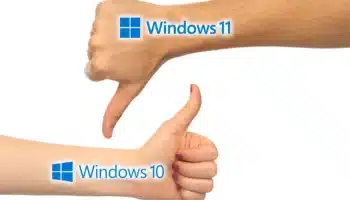Palm's not dead, so why write its epitaph?

Wall Street's vultures are circling over Palm, screeching for its death. Tech pundits are joining the death watch, in one of the more morbid displays of graveyard tech journalism ever. As I've asserted repeatedly, in business perception is everything. The Palm death watch creates negative perceptions about the company and its future that will drive away customers and investors. Palm doesn't have to die, but death may be its future as pundits' self-fulfilling prophecies.
Tech blogs simply exploded with Palm is dead predictions over the weekend following a news story that two Wall Street analysts had cut Palm's target price to $0. Zero? ArsTechnica asserted that "RIP Palm: it's over, and here's why." All Things Digital: "Exercise in Futility? Palm Pre Plus, Pixi Plus Headed to AT&T." OS News: "Is Palm dying?" Monday Note: "Who will buy Palm?" That's a simple sampling.
Facebook jumps the shark

When news broke last week that Facebook users were on the receiving end of a large-scale phishing attack -- the first one to use external e-mail and not just the service's own messaging system -- I started to wonder whether the service had jumped the shark. If this sort of thing continues to escalate, you should start wondering, too.
Hardly a week goes by that Facebook doesn't get hit with another spam, malware, or phishing attack. Last week's screaming headline, that spammers are using conventional e-mail to spread virus-stealing malicious code to Facebook's 400 million users, is the latest chapter of a book that doesn't have an end in sight.
Can Google get away with this? Redirects .CN users to uncensored .HK domain

Chinese citizens and government ministers expecting for Google to take a stand today on the continued censorship of its search results, may have been surprised by the company's decision to split the difference: This afternoon, it began redirecting Google.cn traffic to Google.com.hk, rather than pull out its business interests from China. Hong Kong is a special administrative district of China.
In a blog post this afternoon, Google's Chief Legal Officer David Drummond defended the twist -- not exactly a "move" per se -- as perfectly legal, if potentially unacceptable by China's government. "We want as many people in the world as possible to have access to our services, including users in mainland China," Drummond wrote, "yet the Chinese government has been crystal clear throughout our discussions that self-censorship is a non-negotiable legal requirement. We believe this new approach of providing uncensored search in simplified Chinese from Google.com.hk is a sensible solution to the challenges we've faced -- it's entirely legal and will meaningfully increase access to information for people in China. We very much hope that the Chinese government respects our decision, though we are well aware that it could at any time block access to our services."
IE9 Tech Preview beats latest Firefox alpha, as Chrome 5 clobbers King Opera

How long ago would you have thought it absolutely impossible for the slowest Windows Web browser currently under development to be coming...from Mozilla? Granted, the Internet Explorer 9 Tech Preview isn't a real browser (typically, these things need their own address bars and Back buttons). But unless Mozilla gets its JaegerMonkeys in a row in time for Microsoft to debut IE9 with real features like buttons, the number two reason users cite for switching from Internet Explorer...will be wiped off the map.
In the most sophisticated system of browser tests ever developed -- reconstructed by Betanews in anticipation of the IE9 preview last week -- IE9 in Windows 7 registered a comprehensive index score of 13.17, representing over 13 times the performance of IE7 in Vista SP2. By comparison, IE8 in Windows 7 scored a mere 2.20, representing about six times the performance of Microsoft's current production browser. That's down from our preliminary estimate from last week, but still a very commendable performance gain. Typically, when developers add real features to their browser projects, that tends to slow down overall JavaScript performance. But that doesn't mean Microsoft won't continue to compensate as they improve their own new JavaScript engine, code-named "Chakra."
Motorola launches the first rugged push-to-talk Android phone

Today, Motorola and regional US carrier SouthernLINC Wireless announced the launch of the iDEN-compatible i1, the first Android device to support the wireless protocol with Push-to-Talk walkie-talkie communications.
The i1, which is believed to have been called the "Opus One" internally, has been rumored since late last year.
SanDisk releases its first 32 GB microSD card
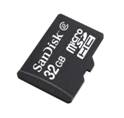
Flash memory giant SanDisk today announced that its highest capacity microSDHC card will be available for purchase tomorrow on US and European Web retail sites. The 32 GB microSDHC will cost $199.99 and is expected to ship immediately.
Worldwide availability of the new memory card is expected next month.
It's not flat if you tilt it 45 degrees: IE usage share in EU remains steady
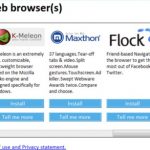
Source: StatCounter Global Stats - Browser Market Share
Amid reports that Internet Explorer's usage share in Europe is "falling faster than a team of skydiving elephants," an examination of the source of the data being cited reveals the possibility of a separate universe with weightless elephants and an IP address. The latest live statistics from global Web analytics firm StatCounter shows the continuing "weekend dip," where IE usage drops and Firefox usage peaks, as solely responsible for the latest round of victory claims from at least one supporter of Europe's browser choice screen for Windows users.
Don't count Palm out yet: Pre Plus and Pixi Plus to launch with AT&T

Palm had big shipments of its new Pre Plus and Pixi Plus last quarter, the
sellthrough was nowhere near what the mobile device company had expected. As a result, Palm posted another losing quarter, and the stock value dropped even further. As usual, the media took the opportunity to write Palm off as a lost cause.
But it's not time to quit on the company just yet.
Be smart, don't buy into the iPad hype
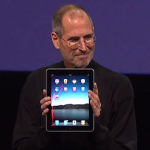
The state of the news media is this: Gossip and rumors are rapidly replacing factual reporting -- in large part driven by the Google economy. No company is benefitting more than Apple, and most recently with the launch of iPad. But rumors are no surefire way to sales success. Big hype will energize early iPad sales, but can it sustain them? I wonder, and perhaps you have the answer. I'm not looking for a scientific answer, just your story to tell -- more on that in at the end of this post.
The Mac-obsessed blogosphere, news media and social crowd is a frightening but exhilarating phenomenon. Marketers and public relations companies across the globe are watching the Apple-hype phenomenon and trying to guess how they can imitate it. They can't. There is inherit bias in the products bloggers, journalists and socialwebites are using, or the companies that they invest in.
Will Viacom's public airing of YouTube's dirty laundry change the Web forever?

The key issue at the heart of Viacom's case against Google and YouTube, filed in March 2007, concerns whether an Internet service that probably knows that files are traded or shown illicitly or without license there, deserves the "safe harbor" provisions of the Digital Millennium Copyright Act that protect ISPs from liability for their customers' actions. In a summary judgment motion filed yesterday with US District Court in New York and unsealed this morning, Viacom is bidding to have the judge wrap up the case -- an obvious signal that it believes its case is already strong enough.
As US law stands now, a service such as Grokster or the original Napster (not the Best Buy division that today uses that name) is liable when it intentionally establishes its service for the express purpose of trading in illicit files. It's especially liable when it finds some way to advertise itself for that purpose. An Internet Service Provider such as Comcast or Cox is not liable when its service is used for accessing one of these sites, when it doesn't advertise or offer these services explicitly, and when a customer can access them without direct intervention from the ISP. And a video site such as Veoh is not liable when any measure it might take to stop customers from sharing illicit files may also conceivably infringe upon the free speech rights of other customers who may not be trading such files.
Let the rejections begin: Apple opens first round of submissions for iPad App Store

In a message sent to developers today, Apple announced that it is now accepting iPad apps for the iTunes app store.
To have apps approved (or rejected) in time for the iPad launch, they must be submitted to Apple by 5:00 pm PDT on Saturday, March 27. Only apps built with the iPhone SDK 3.2 beta 5 are going to be accepted in this round of reviews.
Viacom and YouTube: Timeline of pertinent events

This week, documents from Viacom's billion dollar lawsuit against YouTube for copyright infringement were published, and the three-year-long-and-counting lawsuit has again been brought to the public's attention. In case you haven't been following the case, here's a quick timeline of the major events that led up to the lawsuit, and those that occurred since the original complaint was filed:
May 24, 2005- Viacom subpoenas YouTube for information about a user who uploaded clips from Paramount Pictures' "Twin Towers."
A tale of two "red alerts:" Which Windows warnings should you heed?
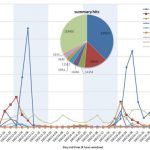
Literally every day at Betanews, we get at least one security vendor "alert" of some type, warning us to be on the lookout for the latest malware. The message is always the same: Advise users to stay vigilant, to keep patching, to upgrade their antivirus to the latest editions. But the profiles of the malware typically look the same, too -- stuff you might click on by accident, links pretending to be from your "best friend" in an e-mail message, ads for products that look too good to be true.
For many of us, the situation is getting to be like the US' terror alert level, which has remained at "Yellow" since the fall of 2007. We starting to forget what "elevated" vigilance means. And maybe that's a problem, because lack of attention to advice about real threats could become as dangerous as lack of attention to any one of those miracle weight-loss links.
Palm posts third quarter results: disappointing sales, more net loss

In late February, Palm issued a shareholder warning which said that profits for the full year were going to be "well below" expectations due to a surprisingly slow demand for Palm's smartphones.
Thursday evening, the company issued its third quarter earnings report, and though the numbers were actually up against the same quarter last year (when Palm posted a net loss of $98 million), the company is still losing money; $22 million, to be exact.
Nvidia admits GeForce drivers responsible for fan problems, issues updates

Download Nvidia ForceWare Drivers for Windows version 197.13 from Fileforum now.
Version 196.75 of Nvidia's GeForce/Ion drivers were indeed responsible for fan overheating problems reported by users. That's the verdict from Nvidia, which in a second round of responses to customer concerns has released version 197.13, which it assures users doesn't have the problem.
Most Commented Stories
BetaNews, your source for breaking tech news, reviews, and in-depth reporting since 1998.
Regional iGaming Content
© 1998-2025 BetaNews, Inc. All Rights Reserved. About Us - Privacy Policy - Cookie Policy - Sitemap.
